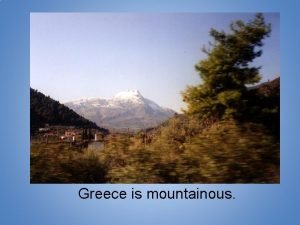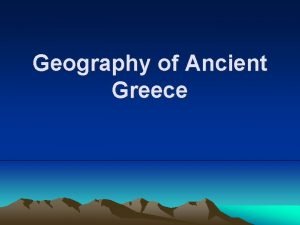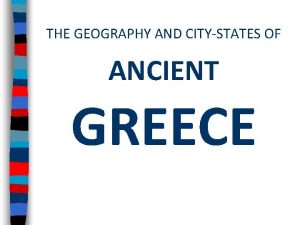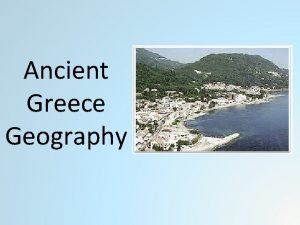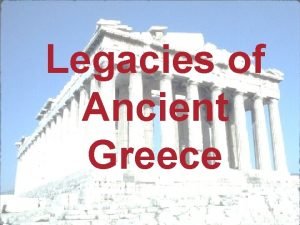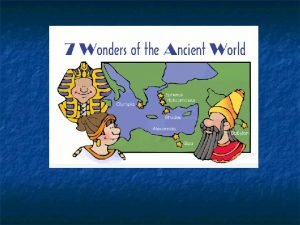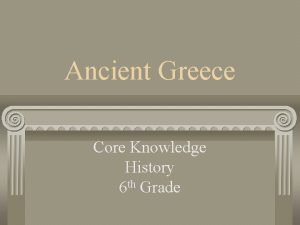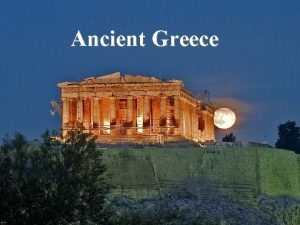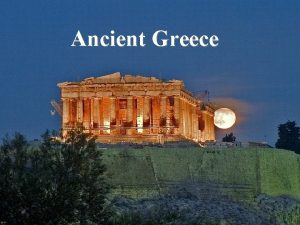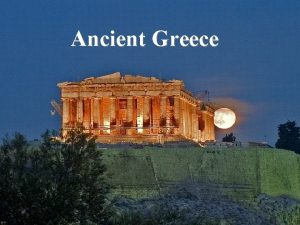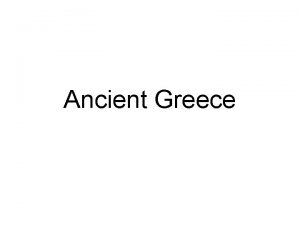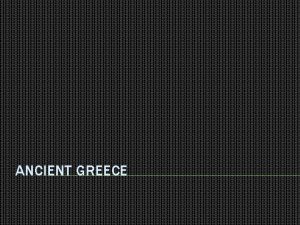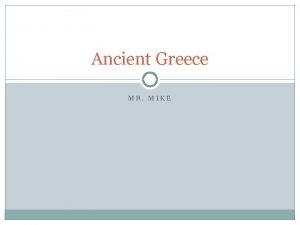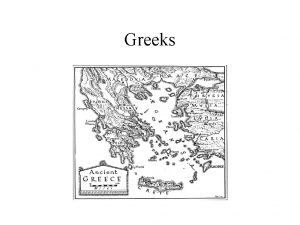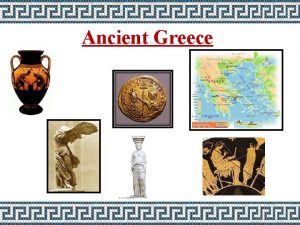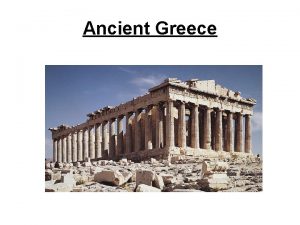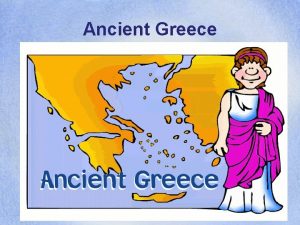Ancient Greece Geography of Greece Mountainous allowed for












- Slides: 12

Ancient Greece

Geography of Greece • Mountainous: allowed for the Greek City. States, or Polis to become isolated and independent of one another. • Seas: Greek city-states and its people became seafarers due to the close proximity of the Aegean & Ionian Seas • Each Polis had an acropolis, agora, and citizens

• Minoans Early Settlers ~ 1 st Greek civilization under King Minos ~ est. Greek Mythology; Earth Mother creator of life ~ peaceful society; focused on sea trade • Mycenaean ~ from Central Asia; conquered Minoans ~ adopted Minoan religion and technology ~ more warlike than the Minoans ~ conquered by Dorians in 1100 s BCE b/c of superior iron weapons • Dorians ~ Greece enters a Dark Age; many fled to Ionia on Asia Minor ~ Bards kept culture alive through storytelling: Homer’s Iliad and Odyssey ~ Ionians reintroduced culture ending the dark age

Ancient Greece • Spans two different eras. – Greek Golden Age: Occurs during the leadership of Pericles in the 5 th Century BCE. The achievements were mainly confined to the city-states of Athens where a strong economy and good government created the conditions necessary for such advancements. – Hellenistic Age: occurs under the leadership of Alexander the Great, who conquered an empire stretching from the Greek mainland all the way to the Indus River Valley. Hellenistic society was a blending of Greek, Egyptian, Persian, and many other cultures that gave rise to advancements in math, science, art, and literature.

Religion • Polytheistic • Greeks used myths and gods to explain nature • Mt. Olympus- home of the gods • Supreme god - Zeus • Greeks held festivals to honor gods, i. e. Olympic Games

Athens vs. Sparta • Athens ~ dev. Democracy ~ eventually all free, Athenian-born men were & citizens could participate in govt. ~ women, slaves, and foreign-born men were excluded ~ focused on trade, agriculture, & overseas colonization • Sparta ~ invaded neighboring states and enslaved local people to gain resources - instead of trading ~ After a slave revolt, Sparta est. a military society ~ men became soldiers, women became the mothers of soldiers – best military in Greece ~ boys began military service at 7 and retired at 60 ~ govt. run by a few men - Oligarchy

Government • First to use democracy as a form of government. • Under Pericles, male citizens in Athens participated in the daily running of government. • This form of direct democracy excluded all non-citizens, such as women and slaves. • 4 forms of govt. existed in Ancient Greece

Philosophy • Greek philosophers, or "lovers of wisdom, " used observation and reason to study the world around them. Famous philosophers: Socrates Plato Aristotle Socratic Method of questioning as a learning tool. Wrote The Republic Favored a strong, controlling government Developed ideas on government Favored the one strong and wise rule as best form. Considered to be first western philosopher Society has three classes: Philosophers, Soldiers, and Workers Human Reason was the key to learning

Literature • Early Greek literature was in the form of plays developed for religious ceremonies. • Famous writers, such as Aeschylus and Sophocles, wrote tragedies and comedies about human conflict and interaction between the gods and man. • Became the basis for modern literature. The Greeks were also the first. • Herodotus, known as the Father of History, wrote books chronicling historical events, such as the Persian War.

Art & Architecture • Greek artists portrayed the human figure in idealized realism. • Paintings and sculptures show humans in the perfect form. • Greek architects build elaborate buildings using marble and the Greek column. • The most famous example of Greek architecture is the Parthenon in Athens. • Many buildings around the world today use Greek architectural ideas.

Math & Science • Greek mathematician Pythagoras, developed a formula to calculate the relationship between the sides of a right triangle, a method still in use today. • Aristarchus, a Greek astronomer, discovered that the earth rotated on its axis, and revolved around the sun. • Eratosthenes discovered that the earth was round, and accurately calculated its circumference. • Euclid wrote a book called The Elements, which is the basis for modern geometry. • Archimedes tried to use science for more practical matters, he showed how the use of a lever and pulley system could lift just about any weight.

Medicine • Hippocrates, a 5 th century BCE physician, studied the causes of illnesses and experimented with various cures. He is also credited with creating a set of ethical standards for doctors called the Hippocratic Oath.
 What 4 seas surround the balkan peninsula
What 4 seas surround the balkan peninsula Where was ancient greece located on a map
Where was ancient greece located on a map Describe the geography of ancient greece
Describe the geography of ancient greece Sparta greece geography
Sparta greece geography About 80 percent of the geography of greece is
About 80 percent of the geography of greece is Ancient greece map
Ancient greece map Legacies of ancient greece
Legacies of ancient greece 7 wonders of ancient greece
7 wonders of ancient greece Core knowledge ancient greece
Core knowledge ancient greece Ancient greece travel brochure project
Ancient greece travel brochure project Ancient greek philosophers final jeopardy
Ancient greek philosophers final jeopardy Greek culture values
Greek culture values Fun facts for greece
Fun facts for greece
